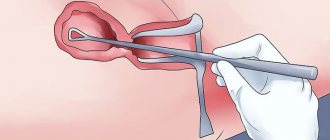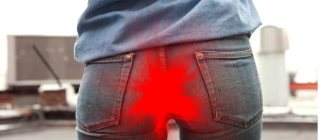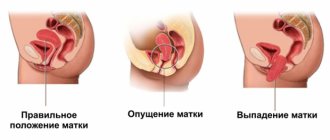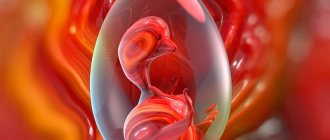What should menstruation be like normally after childbirth?
It takes several months for the body to recover after childbirth. During the first weeks, a woman has a special discharge (lochia). They are associated with cleansing the uterus and are not menstruation. At first, the lochia is bloody, but gradually turns into ordinary colorless discharge. If instead heavy bleeding appears again, this means either the arrival of the first menstruation, or the occurrence of some kind of pathology. Only a doctor can determine the cause.
What affects menstruation after having a baby?
The following factors influence the timing of the first period:
- Length of breastfeeding period. If a woman for some reason does not breastfeed, then the first menstruation most often comes after 5-8 weeks, and if she does breastfeed, then they can come after 7-12 months.
- Feeding regimen. Regular feeding and late introduction of complementary foods usually delay the onset of the first menstruation.
- The nature of pregnancy and childbirth.
- The condition of the reproductive organs, the presence or absence of diseases that existed before pregnancy or that appeared later.
Warning: Exceptions to the general rules are quite possible. We must remember that breastfeeding does not provide a 100% guarantee that menstruation and the possibility of conception will not be restored faster.
Heredity matters. A woman's first menstruation occurs after about the same time as her mother or grandmother.
What are normal periods?
Normal periods are considered to last 3-7 days, during which the total volume of blood discharge is approximately 50-80 ml. The consistency and color should not normally change.
It is possible that periods after childbirth will become less painful if, before pregnancy, the pain was caused by a violation of the shape and location of the uterus (for example, a bend of the cervix, the presence of areas of stagnation of blood in the cavity). During pregnancy before childbirth, it increases in size, stretches, and stops squeezing the nerve endings. All this contributes to the disappearance of menstrual pain after the birth of a child.
Stretching of the uterus leads to an increase in the volume of its cavity and, accordingly, an increase in the mass of the mucous membrane. This can make periods heavy and prolonged.
Over the course of several months, the uterus gradually decreases in size. For some women, by the time the first menstruation occurs, its size already corresponds to what it was before pregnancy, so the volume of menstrual flow does not differ. During the first few months, cycles are irregular and periods are unstable in duration. This is not considered a violation if the woman does not have obvious symptoms of gynecological diseases.
It is important to know: It happens that already in the first menstrual cycle after childbirth, a woman conceives. In this case, menstruation will not appear, the woman will not immediately understand what happened. She will become pregnant again when the body has not yet had time to recover. Such a pregnancy often ends in miscarriage. To avoid surprises, it is recommended to start using contraception 4 weeks after birth, after consulting with your doctor about the choice of contraception.
Video: Changes in the body after the birth of a baby, methods of contraception
How long after giving birth do menstruation begin?
The timing of the appearance of the first menstruation after childbirth depends on many factors - the woman’s age, the characteristics of pregnancy and delivery, lifestyle and daily routine. But the most important factor is the nature of the child’s feeding.
When does your period come while breastfeeding?
During lactation, the hormone prolactin predominates in the female body - this substance is responsible for milk production, but inhibits reproductive function. Therefore, menstruation does not occur until the end of the breastfeeding period, but this rule only applies when feeding the baby on demand. When feeding according to a schedule, menstruation can begin as early as 3-4 months after birth.
Do not deviate from the feeding schedule, your period will not keep you waiting
If your periods suddenly disappear during breastfeeding, this may indicate a second pregnancy - menstruation begins 2 weeks after ovulation, this time is quite enough for conception, so a nursing mother needs to use barrier contraception; frequent childbirth greatly undermines health.
With natural feeding, menstruation may begin after the introduction of complementary foods.
How long does it take for menstruation to occur when breastfeeding?
If a child is fed formula from birth, the level of prolactin in the woman’s body quickly decreases to the minimum acceptable values, so the first menstruation should occur 6-8 weeks after birth, almost immediately after the disappearance of lochia.
Pathological discharge. When to go to the doctor
Pathology is considered to be a significant increase in the volume of menstruation after childbirth (daily blood loss more than 20 ml), a change in the nature of discharge (the appearance of large clots, lumps, foam, purulent mucus, as well as the presence of a strong odor). In addition, a sign of disorders is spotting between menstruation, if it is accompanied by constant pain in the lower abdomen and lower back, which intensifies during menstruation. Particularly dangerous are heavy intermenstrual bleeding, accompanied by severe pain.
Pathological blood loss leads to anemia, a drop in hemoglobin levels, and oxygen starvation of body cells. Too heavy periods after childbirth may be accompanied by dizziness, weakness, headache, nausea, and fainting. With uterine bleeding, sharp pain appears, which indicates the occurrence of a life-threatening condition (for example, rupture of a cyst, ectopic pregnancy).
You should consult a doctor in the following cases:
Read more What treatment is prescribed for hepatitis C
Video: How long after childbirth does your period come?
When do you need to urgently go to the gynecologist?
After giving birth, a woman should definitely come for a scheduled visit to the doctor; this moment occurs approximately in the second month after the birth of the baby. If something bothers her, she must tell her doctor about her suspicions.
You need to urgently see a specialist in the following cases:
- the presence of very heavy periods after childbirth, when one pad is not enough for 1-2 hours;
- the duration of bleeding exceeds a week;
- the discharge is bright red;
- if there are clots in the menstrual blood, and severe pain is also felt;
- if the discharge has a persistent unpleasant odor.
There are also a number of symptoms that should alert a woman after childbirth, for example, if breastfeeding has ended and there has been no menstruation for more than six months. This may indicate serious illness or complications after childbirth.
In very rare cases, the absence of menstruation after childbirth becomes a sign of premature menopause.
After childbirth, heavy periods can cause iron deficiency anemia. For young mothers, this is a very dangerous condition, since they have not yet recovered from pregnancy, childbirth, lack of sleep at night and constant stress.
If everything was going fine, but the following symptoms appeared along with the arrival of your period, you should definitely see a doctor:
- constantly want to sleep;
- the woman gets tired quickly;
- dizzy;
- weakness;
- causeless irritation;
- pale skin;
- dry and brittle hair and nails.
If these symptoms are present, the gynecologist can prescribe medications that stop blood loss and increase the level of iron in the woman’s body.
To accurately determine the reason why the first periods after childbirth are heavy, a gynecologist can conduct the following studies:
- blood test for hormone levels;
- Ultrasound examination of the pelvic organs;
- will examine and interview a patient whose menstruation is abnormally intense.
Only after collecting a complete medical history, the doctor makes a diagnosis and prescribes appropriate treatment.
Possible causes of pathological changes in the nature of menstruation
The reasons why periods become heavy after childbirth may be hormonal disorders, as well as some diseases of the reproductive organs. Hormonal abnormalities arise due to problems with excess weight, metabolism, dysfunction of the thyroid and pancreas, as well as the pituitary gland.
Often the reason for the late onset of the first menstruation and the instability of their intensity is an excess of prolactin. The pituitary gland continues to produce it for some time after breastfeeding ends. In order to find out the cause of this phenomenon, it is necessary to undergo a general examination and check the levels of hormones in the blood.
Heavy periods with uterine diseases
Placental polyp. Sometimes during childbirth the placenta does not come out completely, its particles remain in the birth canal and adhere to the mucous membrane. After this, heavy menstrual bleeding may occur.
Endometrial hyperplasia. Damage to the surface of the uterus during childbirth leads to excessive growth of the endometrium (hyperplasia), which is manifested by an increase in the volume of discharge. If timely treatment is not started, endometriosis occurs (spread of the endometrium beyond the uterine cavity, reaching the ovaries and abdominal cavity).
Neoplasms in the uterus and ovaries. Cysts, polyps, myomatous nodes can be detected during pregnancy. But if observation showed that they did not increase in size and did not pose a threat to the development of the fetus and the woman’s health, treatment was not carried out. After childbirth, their formation and growth lead to increased menstrual bleeding.
Consequences of decreased immunity
Inflammatory and infectious diseases of the uterus and ovaries. Their consequences are the formation of scars and adhesions, disruption of the development of the endometrium, and the appearance of cystic cavities in the mucous membranes of the cervix and ovaries. All this causes menstrual irregularities, including the appearance of heavy periods after childbirth.
During pregnancy, a natural decrease in immunity occurs to prevent the mother's body from rejecting the fetus. Subsequently, the immune system should quickly recover. If there was anemia, the woman did not eat well, experienced stress, the birth was difficult, then the body’s resistance remains low, which contributes to the development of inflammatory and infectious processes.
The infection can be introduced into the genitals during complicated childbirth (with ruptures, the need to use obstetric instruments), as well as during delivery by cesarean section. Subsequently, there is an exacerbation of chronic diseases, as well as the emergence of new ones due to infection with various types of infections.
Cycle
In the normal state, monthly discharge after childbirth during artificial feeding depends on the interaction of the uterus and ovaries. Menstruation will come when the components of the process are prepared. The uterus regenerates quickly, because on the 7th day after delivery, the organ will shrink by half.
Concomitant factors interfere with rapid involution, and therefore the resumption of the cycle in the absence of lactation. This is the third and subsequent pregnancies, the age of the woman giving birth is over 35, a difficult birth, non-compliance with the postpartum regimen.
During the postpartum period, the ovaries also undergo reverse development, and the corpus luteum is renewed. After complete regeneration of functionality, new follicles begin to mature again and the cycle, in the absence of breastfeeding, is quickly restored.
When does menstruation start after giving birth while breastfeeding? 2 months after childbirth, a stable menstrual cycle resumes. In addition to timing, other factors need to be taken into account. What is pathological for one woman is normal for another.
The female body produces prolactin, which promotes lactation and suppresses ovarian function. The hormone does not allow the eggs to mature and be released, so ovulation does not occur. In the absence of breastfeeding, prolactin is not produced in large volumes, and menstruation occurs 8-10 weeks after birth.
What to do if you have heavy periods
First of all, you should consult a doctor so as not to miss the onset of serious diseases and complications. An ultrasound of the pelvic organs, blood tests and vaginal smear tests for the presence of infection are performed. The blood is tested for the content of various hormones, as well as iron.
Drug treatment is prescribed: hemostatic agents, painkillers, vitamins, iron supplements. Hormonal therapy is usually carried out after breastfeeding ends.
Sometimes heavy periods after childbirth, arising due to pathologies, can be eliminated by curettage of the uterus, complete removal of the endometrium, tumors contained in it and the remains of the placenta.
No matter what new mothers say, any pregnancy comes with difficulties, but a huge plus is the absence of menstruation for as much as 9 months, and maybe longer. But you can’t argue with nature, the female cycle is restored, and, alas, menstruation resumes. But sometimes their character may differ slightly from the usual. For example, women often note that the first periods after childbirth are very heavy or, on the contrary, scanty. Is this the norm or a deviation, we will analyze it in this article.
Causes of heavy periods
Heavy periods after childbirth are sometimes strong, which makes a woman panic.
However, there are objective reasons for this phenomenon that must be taken into account when determining normality or pathology:
- physiology. While carrying a baby, a woman’s internal genital organs change, the uterus increases in size, and, consequently, the area of the endometrium. The amount of the rejected layer will be greater, hence the more abundant discharge, which can be observed both in the first month and several subsequent ones;
- Women who had to give birth by cesarean section or suffered complications experience very heavy periods after childbirth;
- in the presence of chronic diseases that were not treated before childbirth, and, if necessary, during pregnancy, menstruation will be irregular in the first months, and quite heavy;
- inflammatory processes that occur during pregnancy or during childbirth will also affect the first menstruation;
- iron deficiency anemia can cause heavy discharge during the first menstruation;
- poor nutrition during pregnancy, leading to exhaustion of the body;
- stressful situations, both during pregnancy and after birth.
Why there are heavy periods, and whether this condition is normal, only a specialist can say. Therefore, the first consultation in the postpartum period should be in 1.5-2 months. If this is very problematic, then at least after the first menstruation. In case of timely treatment, the doctor will determine the presence of the disease and, if necessary, prescribe treatment.
Discharge after childbirth
Immediately after the birth of the child and rejection of the placenta, uterine bleeding begins. They are in no way connected with menstruation and in medicine such discharge is called lochia. The duration of lochia depends on many factors, such as: complications during pregnancy, woman’s physiology, labor, breastfeeding, etc. On average, this discharge lasts about 2 months.
In the first days after childbirth, a woman loses a lot of blood, because there is now a wound at the place where the placenta was attached. The duration of the discharge will depend on how quickly it heals. Therefore, heavy bleeding in the first days after childbirth is normal. Naturally, you should be alarmed if you do not have time to change the pads, and the sheet or diaper turns out to be very dirty. In this case, you must immediately notify your doctor.
Gradually, the lochia will change consistency and color. Within a week, the discharge will not be bloody, but lighter. If after 2-3 weeks, that is, after the lochia has acquired a light shade, bleeding starts again, you should definitely see a doctor; it’s a mistake to think that it’s your period.
Cycle after cesarean
Caesarean section has the peculiarities of restoring menstruation. This happens in almost the same way as during normal labor, but a little later.
When is the cycle restored after childbirth with artificial feeding? As with natural childbirth, after 2 months. But this is individual. How quickly everything will resume depends on the woman.
To initiate ripening and rejection of follicles, it is necessary to completely restore the functioning of the ovaries and uterus. Due to the fact that the internal genital organs are injured during the operation, they take longer to return to their previous state. This means that the cycle will be restored with a delay.
However, prolactin produced during lactation is not produced in large quantities. Therefore, menstruation comes already 1-2 months after birth, while when breastfeeding and self-delivery, menstruation begins only after the child has completely switched to complementary feeding.
Infections and inflammations of the reproductive system in the postoperative period negatively affect the cycle during artificial and breastfeeding of the baby. It is necessary to monitor your sexual health so as not to miss alarming symptoms.
Surgical delivery is the cause of irregular periods after childbirth with artificial feeding. Inflammation and complications of the restoration of menstruation occur. If there is prolonged spotting, severe pain or heavy discharge, you must immediately contact a gynecologist to eliminate the pathology through medication.
When to expect your first period after giving birth
The menstrual cycle, in essence, is a guarantee of the health of a woman’s reproductive system. In order for a woman to ovulate again after childbirth, first of all, the body as a whole and the uterus in particular must recover. This process may take a different amount of time for each woman in labor, but on average, complete recovery takes about two months.
The resumption of the menstrual cycle is influenced by factors such as:
- Lactation. The fact is that when a woman breastfeeds her baby, the hormone prolactin is produced, which inhibits the reproductive system, thereby preventing menstruation. In non-breastfeeding women, the cycle is restored much earlier.
- Psychological condition.
- Complications during pregnancy and childbirth.
- Woman's age.
- Lifestyle (nutrition, proper rest).
How soon will the menstrual cycle return?
Even the fact that you have already had your first period does not indicate that your menstrual cycle has fully returned. It is possible that the cycle will remain irregular for some time, and the volume of blood lost will differ each time. So, for example, usually after childbirth the first periods are very heavy, but they can also be very scanty, which confuses women.
We can talk about complete recovery only six months after the start of the first menstruation. If during this period of time the cycle has not returned to normal and continues to fluctuate, a hormonal imbalance has probably occurred and it is time for you to visit a gynecologist.
Read more What is cervical hyperkeratosis?
In any case, you should remain calm, your body has suffered a colossal load during pregnancy and childbirth, so problems such as very heavy first periods after childbirth are physiological in nature and are usually easily treated.
The sequence of restoration of menstruation after childbirth with artificial feeding
Immediately after the completion of childbirth, the condition of all organs and systems of the female body begins to gradually approach pre-pregnancy. During the first 1.5-2 months, a lot of changes occur that affect not only the endocrine, but also the cardiovascular systems, as well as the reproductive and nervous systems, and the mammary gland system.
To restore menstruation after childbirth, the process of uterine involution must be completed. It comes gradually. In the first 12 days, the fundus of the uterus gradually descends. Subsequently, it decreases in size and gradually decreases in mass. In addition, in the first 10 days, the internal os of the uterus is formed, as well as the external os is closed, acquiring a slit-like shape. It also takes about 8 weeks to restore the endometrium of the uterus.
The course of the process of uterine involution is largely determined by the general health of the woman, the characteristics of childbirth, as well as sleep and rest patterns in the postpartum period.
The first periods after childbirth are very heavy: normal or pathological?
So what is the reason for heavy periods after childbirth? Many factors can serve as sources of such unpleasant symptoms. The first thing the doctor may do is ask you how the birth went, whether you gave birth yourself or had a caesarean section. Usually, complicated labor is the root cause of why the first periods after childbirth are very heavy.
The second most popular cause of this problem may be the general condition of the woman. If you had any chronic diseases before pregnancy, then you should not be surprised if after childbirth the first periods are very heavy and do not end for a long time.
Thirdly, there are frequent cases of heavy menstruation after birth injuries or inflammatory processes of the reproductive system. Remnants of undelivered placenta can also be the result of severe bleeding.
Possible complications of heavy periods
Heavy periods during the postpartum period can provoke a very unpleasant complication - iron deficiency anemia. Due to a weakened general condition after childbirth, constant lack of sleep, and hormonal changes in the body, women who have recently given birth are at risk.
The symptoms of this terrible disease are:
- drowsiness and general fatigue even after rest;
- rapid fatigue after minor exertion;
- intolerance to physical activity, even minimal;
- dry and pale skin, brittle nails, dull hair;
- dizziness, reaching the point of fainting;
- dark spots before the eyes, especially noticeable after a sharp rise of the body.
In such cases, patients are prescribed hemostatic drugs along with iron supplements. But before this, research is carried out to identify the cause of this condition, so as not to miss a more complex pathology.
https://youtu.be/unWtItWztNQ
When should you sound the alarm?
To begin with, you should distinguish between heavy menstruation and bleeding. In the first case, we are talking about normal periods, but with the difference that the duration of the discharge is a little longer than usual or, for example, a couple of pads are used more than the rest of the time. Such menstruation, although unpleasant, does not pose a significant danger. Enough to relax and spend time outdoors.
It’s a completely different matter if menstruation lasts more than 7 days, and the woman loses a lot of blood, resulting in a weakened state of the whole body, nausea and drowsiness. If after childbirth the first periods are very heavy and this is accompanied by severe pain and blood clots, you should immediately seek help from a doctor. You may need hospitalization and even curettage of the uterine cavity.
Signs of iron deficiency anemia
Abundant and frequent blood loss is not only unpleasant, but also extremely life-threatening. If you don't take action, nothing good will happen. We all know that the blood contains iron, and excessive loss of iron can lead to anemia, a condition that requires immediate treatment.
Thus, very heavy first periods after childbirth are primarily fraught with the development of iron deficiency anemia.
The following signs clearly indicate excessive blood loss and a dangerous condition of the woman:
- headaches, migraine;
- tachycardia;
- lack of air;
- nausea;
- dizziness.
In addition to the above, many people report irritability and aggression. Taking any medications containing iron on your own is extremely dangerous. Treatment should be carried out strictly under the supervision of a doctor, and in some cases even in a hospital setting. You can use traditional medicine recipes, but with great caution.
Discharge with clots
Bleeding with clots immediately after childbirth is quite normal. This is the uterus, contracting, as if pushing out the remnants of the fetal vital activity, thereby returning to its original state. Typically, such discharge occurs while in the maternity hospital, and after discharge home it noticeably decreases.
It’s a completely different matter if blood clots appeared during menstruation a few months after childbirth. Of course, this is not always bad and sometimes is physiological in nature, but more often it can indicate possible pathologies and abnormalities in the functioning of the body.
So, if after childbirth the first periods are very heavy and with clots, the reasons may be the following:
- Partitions on the walls of the uterus prevent the immediate removal of blood, due to which the blood has time to clot.
- Bicornuate uterus - with this structure of the uterus, women complain of prolonged periods with clots, accompanied by severe pain.
- Hormonal disbalance.
If after childbirth the first periods are very heavy, what should you do?
To begin with, you should remain extremely calm and carefully monitor your well-being. If there is no serious pain or fainting, you can wait for the next cycle, perhaps everything will return to normal on its own and your periods will return as before. But this course of action is permissible only if there really are no serious complaints. In all other cases, there is no need to postpone your visit to the doctor.
If heavy menstruation is accompanied by pain, weakness and low blood pressure, it is strongly recommended to consult a gynecologist. At your appointment, the doctor will definitely examine you, evaluate vaginal discharge and the condition of the uterus, take a smear and refer you for additional blood tests. Of the instrumental diagnostics, ultrasound examination is most often prescribed. Usually the above is quite enough to identify pathologies and causes of heavy menstruation.
Treatment of heavy bleeding
If a woman sees a doctor on time, outpatient treatment is possible, but more often, after all the examinations, the woman is placed in a hospital and the following medications are prescribed:
- hemostatic drugs;
- drugs to restore iron in the blood;
- vitamins.
After the woman’s condition has stabilized, the doctor may prescribe preventive procedures. Traditional methods and even homeopathy may not be superfluous, but before doing anything, you must consult with a specialist. Answer to the question “After giving birth, the first periods are very heavy - is this normal or not?” Only a doctor can give it, since everything is individual.
Heavy periods after childbirth are neither normal nor pathological. Every woman’s body is individual, and if bleeding does not worsen your overall well-being, you don’t have to worry about your health.
If the discharge is accompanied by severe pain and pieces are visible in it, you need to contact a gynecologist for clarification.
Features of postpartum menstruation
It does not matter how the newborn was born - natural or through caesarean section. The mother always starts bleeding, the cause of which is placental abruption. The process of childbirth traumatizes the uterus; there is a wound inside it. She needs new endometrium for complete healing. What a woman sees after giving birth is not real menstruation. These are lochia that last up to 40 days.
Initially bloody lochia gradually become colorless. If blood is released from the genital tract again, this indicates the beginning of the first postpartum menstruation, or the development of pathology. Let's consider what factors influence the onset of menstruation in the postpartum period:
- Features of the course of pregnancy and childbirth.
- Duration of lactation. When breastfeeding, mothers begin bleeding after 6 to 12 months. If the baby switches to artificial feeding early, the mother will start her period in 5 to 8 weeks.
- Infant feeding regimen. Attachment to the breast on demand and later introduction of complementary foods delay the arrival of critical days.
- The presence of serious diseases of the reproductive system that the woman encountered before pregnancy or acquired later.
- Heredity. After the birth of a child, a young woman’s period appears at approximately the same time as that of a mother or grandmother.
Read more What is a lumpy uterus?
If menstruation was painful before pregnancy, after childbirth this problem may resolve on its own. Bend of the cervix and other anomalies that interfere with the free flow of blood disappear due to the fact that the uterus stretches during fetal growth and does not compress the nerve endings. After childbirth, a woman notes the absence of menstrual pain.
If after childbirth your periods become heavier, this is due to an increase in the volume of the uterine cavity. The area becomes larger due to stretching of the organ. The amount of internal mucous membrane also increases. All this leads to long, heavy menstruation.
In the postpartum period, the uterus gradually contracts and by the beginning of the first menstruation its size is restored to the values that were before pregnancy. For several months in a row, bleeding may be irregular and vary in duration. In the absence of symptoms of gynecological diseases, such behavior of the reproductive system will not be a deviation.
https://youtu.be/OQ8levtIYAc
During the period of postpartum spotting, until the cycle is established, a woman should carefully take care of contraception. Repeated conception several months after childbirth exhausts the weakened body even more and often ends in miscarriage.
Why do my periods come heavily after childbirth?
The first periods after childbirth can be very heavy for various reasons:
- Stress.
- C-section.
- Endometriosis.
- Uterine fibroids.
- Excess weight.
- Decreased immunity.
- Changes in prolactin balance.
- Incorrect course of metabolic processes.
- Natural childbirth, but complicated.
- Poor nutrition during pregnancy.
- Iron-deficiency anemia.
- Malignant neoplasms in the uterus and appendages.
- The growth of cysts and polyps that were small before childbirth.
- Chronic diseases that are not cured before childbirth.
- Disruption of the pituitary gland, thyroid and pancreas.
- Placental polyp (particles adhere to the uterine mucosa).
- Inflammatory and infectious diseases of the genital area (scars, adhesions, cystic cavities lead to menstrual irregularities and cause heavy bleeding; the infection is introduced into the genitals by obstetric instruments or penetrates through ruptures).
When there are heavy periods with clots after childbirth, the woman most likely has progressive endometrial hyperplasia.
The disease occurs against the background of hormonal disorders or birth injuries. Treatment in this case takes place in the form of a curettage procedure, which diagnoses the presence of a neoplasm and prevents severe blood loss. Hormone therapy is practiced after completion of lactation.
To treat anemia, the doctor prescribes iron supplements and gives recommendations on organizing a daily routine and proper nutrition. A healthy lifestyle, treatment of chronic pathologies and lack of stress accelerate the postpartum restoration of menstrual function.
Clots with an unpleasant odor that are released from the genital tract along with cramping pain may be particles of the placenta. Having concentrated in the uterine cavity and beginning to decompose, they become sources of infection. Sometimes foul-smelling clots are a sign of endometriosis.
Reason to urgently consult a doctor
Normally, the first periods after childbirth should be moderate. If a woman uses several pads during the day, and the bleeding lasts no more than a week, this is normal menstruation. But if the critical days drag on for 10 or more days, the appearance of the discharge is alarming, and your own feelings are disturbing, you need to urgently consult a gynecologist.
It is recommended to immediately visit a doctor if you have the following symptoms:
- One pad is not enough for 2 hours (daily blood loss is more than 20 ml).
- The color of blood is scarlet and bright.
- Body temperature rises for no reason.
- Intense blood loss is observed for more than 7 days.
- Menstrual discharge contains clots, purulent mucus, lumps, and foam.
- The contents of the gasket have a specific unpleasant odor.
- Spotting between periods with constant pain in the lower abdomen and lumbar region (discomfort increases during menstruation).
- Heavy intermenstrual bleeding with sharp pain in the lower torso.
If the child is six months old, he switched to artificial feeding a few weeks ago, and the cycle is not restored, the mother should also discuss this situation with the doctor. Lack of time to visit an antenatal clinic and ignoring heavy periods after childbirth lead to major health problems. The first of these is iron deficiency anemia.
Symptoms of iron deficiency in the body are:
- Weakness.
- Tachycardia.
- Pale skin.
- Drowsiness.
- Dyspnea.
- Irritability.
- Dizziness.
- Dryness and hair loss.
- Brittle nails.
- Fast fatiguability.
To prevent the dangerous consequences of anemia, doctors prescribe drugs that stop bleeding (hemostatics) and vitamin complexes that replenish iron reserves. Considering that excessive monthly discharge often indicates a disease, the patient is referred for an ultrasound of the pelvic organs and a blood test for hormones.
Heavy periods after childbirth: what to do
If after giving birth your periods begin to come more heavily than before, the doctor will tell you what to do in this case. First of all, you need to review your diet and introduce a large amount of fortified foods into the menu. Iron-fortified foods are especially beneficial. A woman should eat fresh vegetables and fruits every day.
If the diet is powerless, and anemia with heavy bleeding continues to bother the patient, she is prescribed hemostatic drugs:
But it is best to take care of preventing blood loss even before pregnancy or while carrying a baby.
To do this, the expectant mother must treat all chronic diseases, undergo tests in a timely manner after registration, eat only healthy food, stop smoking and do not drink alcohol, avoid stressful situations and conflicts, and also wisely distribute hours of work and rest.
First aid for female bleeding
At home, a woman can provide first aid to herself for heavy postpartum bleeding. You can apply an ice compress to the lower abdomen and take a Vikasol, Tranexam or Dicinone tablet.
It is better to consult a doctor about the dosage of drugs, since hemostatic agents have side effects and contraindications. Among folk remedies, it is useful to drink a decoction of nettle or yarrow.
Post Views: 46











